From Challenges to Comfort: Palliative Care for Dementia Patients
Practical ways palliative care makes life more comfortable for dementia patients, addressing their physical and emotional needs with care.
The Mediterranean diet isn’t built on trendy superfoods or elaborate recipes. Its stars are humble: tomatoes, garlic, olive oil, and lentils, to name a few. But these staples work together like an orchestra, harmonizing to promote heart health, fight inflammation, and even protect the brain.

Somewhere on the Greek island of Ikaria, where the Aegean Sea laps gently at rocky shores, a group of elderly friends sits around a wooden table. It’s a weekday afternoon, but no one’s in a hurry. They’re nibbling on small plates of olives and roasted vegetables, sipping red wine, and talking about everything from family gossip to the weather. Many of them are in their 90s. Some have passed 100. And they’re not just alive—they’re thriving.
This isn’t an isolated scene. Across the Mediterranean, in parts of Italy, Spain, and even southern France, people grow old with a vibrancy that defies modern expectations. Researchers have long been fascinated by these "longevity pockets," or blue zones wondering how people in these regions maintain such remarkable health well into old age. The secret, many believe, lies in what they eat.
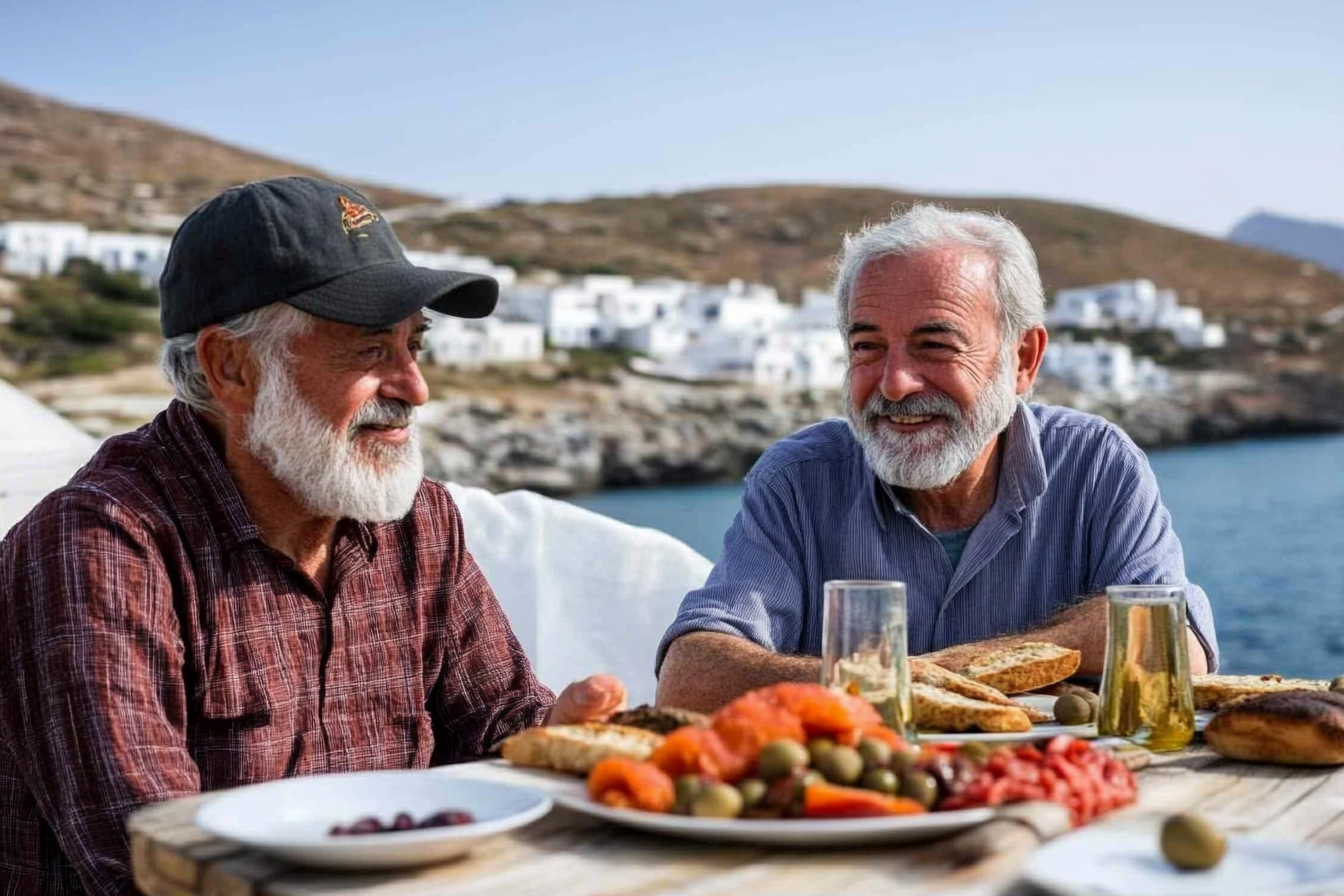
But longevity isn’t just about living longer. It’s about living better—avoiding the chronic illnesses and frailty that so often come with aging. That’s where the Mediterranean diet comes in. It’s not just food; it’s a way of life that connects people, reduces stress, and protects against disease. Living for as long as possible, as healthy as possible is what having a good healthspan is all about. Today we feel dominated by fast fixes and fad diets, this timeless eating pattern stands apart, with science to back it up.
The heart is an intricate machine, beating over 100,000 times a day to keep us alive. Yet heart disease remains the leading cause of death worldwide. The Mediterranean diet appears to be a natural shield against this deadly condition.
At its core is olive oil, sometimes called "liquid gold." Unlike the fats lurking in processed snacks or fast food, olive oil is packed with monounsaturated fats—the kind that lowers “bad” LDL cholesterol while boosting “good” HDL cholesterol. It also contains powerful antioxidants called polyphenols, which protect the blood vessels from damage.

Then there’s fish, a staple in Mediterranean cuisine. Rich in omega-3 fatty acids, fish helps regulate heart rhythms and reduce inflammation, both critical for keeping arteries clear and healthy. Sardines, mackerel, and anchovies—humble, affordable fish that most people overlook—are dietary stars in this region.
But it’s not just about what they eat; it’s also what they avoid eating. Red meat, for instance, is rare on Mediterranean tables, reserved for special occasions. Instead, meals center on plant protein sources like beans, lentils, and whole grains, which provide fiber that helps lower cholesterol levels. The result? People who follow this diet have significantly lower rates of heart attacks and strokes.
Chronic diseases like diabetes, cancer, and obesity are often described as modern plagues—ailments tied to lifestyles filled with sugary snacks, sedentary habits, and processed foods. The Mediterranean diet offers a counterpoint: an approach to eating that naturally will help you keep these conditions at bay.
Let’s start with diabetes. This condition, which affects millions worldwide, is often linked to the spikes and crashes in blood sugar caused by refined carbohydrates. White bread, sugary drinks, and pastries are rare in traditional Mediterranean kitchens. Instead, you’ll find hearty whole grains—dense, nutty loaves of bread, chewy barley, and couscous made from whole wheat. These foods digest slowly, keeping blood sugar levels stable.
When it comes to cancer, the story gets more complex but no less compelling. Antioxidants—found in abundance in Mediterranean staples like tomatoes, peppers, and leafy greens—play a vital role in fighting oxidative stress, which can damage cells and lead to cancer. Herbs like oregano and rosemary, often used liberally in cooking, contain compounds that have been studied for their anti-cancer properties. Even the small glass of red wine that accompanies many Mediterranean meals is rich in resveratrol, a compound that may help prevent tumor growth.
Finally, obesity, a risk factor for nearly every chronic disease, is strikingly low in Mediterranean countries. This is partly because the diet emphasizes whole, unprocessed foods. A plate of grilled vegetables drizzled with olive oil or a lentil stew spiced with garlic and bay leaves fills you up without packing on unnecessary calories. Portion sizes are modest, and meals are designed to be savored, not scarfed down.
As scientists piece together these findings, one thing becomes clear: the Mediterranean diet isn't only to help prevent illness—it builds a foundation for a longer, healthier life. And its power lies not in expensive superfoods or strict rules but in the everyday choices that people have been making for centuries.
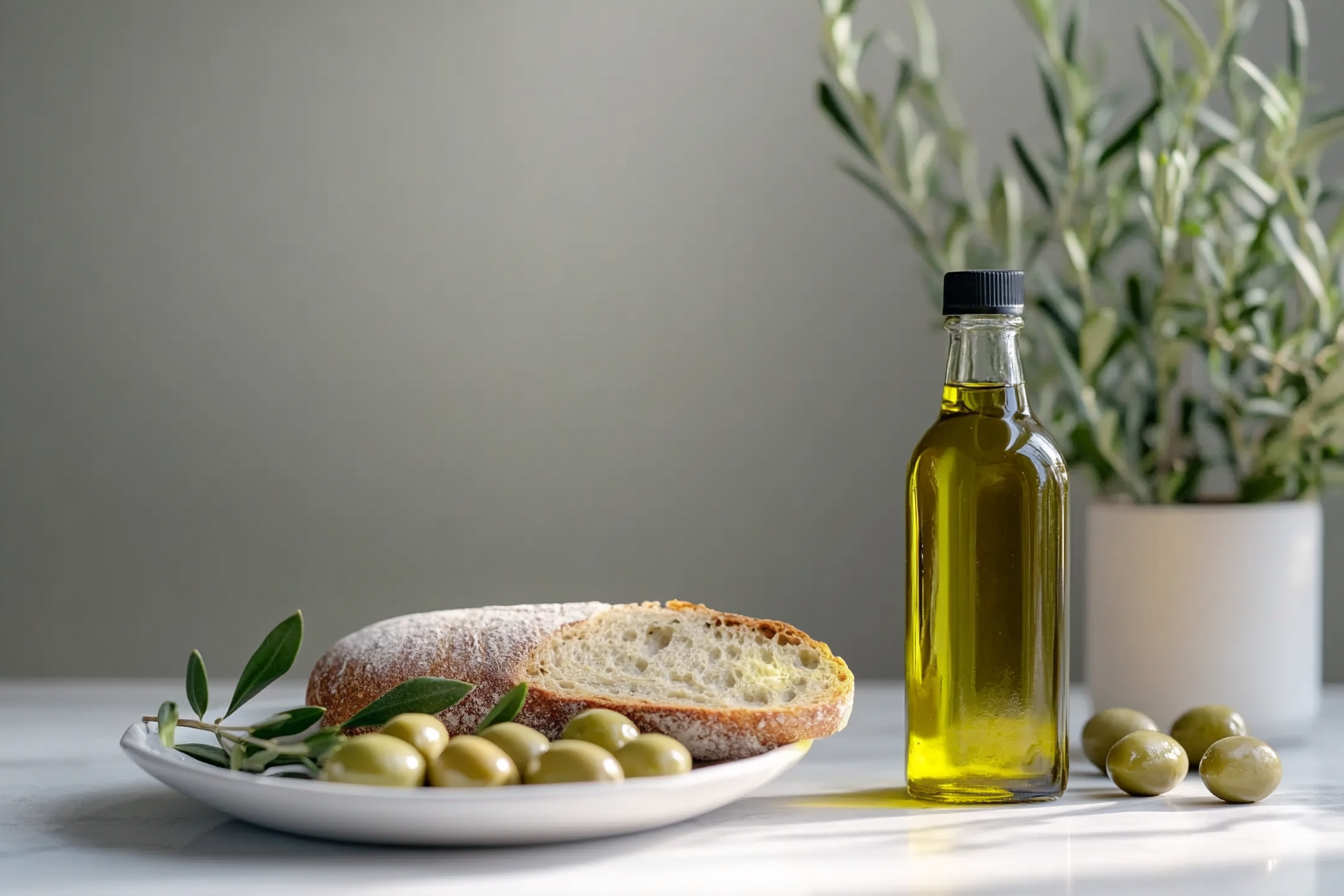
There’s a saying in medicine: “Health starts in the gut.” While that might sound like an oversimplification, there’s a growing body of evidence to back it up. The trillions of bacteria that live in our digestive tract—collectively known as the microbiome—do more than help us digest food. They produce vitamins, regulate hormones, and even communicate with the immune system to fend off disease. The Mediterranean diet, with its emphasis on plant-based and fermented foods, is a champion of gut health.
Consider fiber, the most important part of your diet that you probably eat the least of. Found in abundance in fruits, vegetables, and legumes, fiber serves as food for the beneficial bacteria in the gut. Chickpeas, lentils, and artichokes are particularly rich in prebiotics—compounds that help these bacteria thrive. A healthy microbiome, in turn, can reduce inflammation throughout the body, a key factor in preventing autoimmune diseases and even depression.
Then there’s yogurt, a breakfast staple in many Mediterranean households. Packed with live cultures, it’s one of the most potent probiotics around. These live bacteria replenish the gut microbiome, improving digestion and supporting the immune system. Combined with other fermented foods like pickled vegetables or aged cheeses, yogurt turns the Mediterranean table into a microbiome paradise.
The diet’s minimal reliance on processed foods is another gut-friendly aspect. Highly processed products often disrupt the balance of gut bacteria, leading to problems like bloating, inflammation, and a weakened immune system. The Mediterranean approach—rooted in simple, fresh ingredients—avoids these pitfalls entirely.
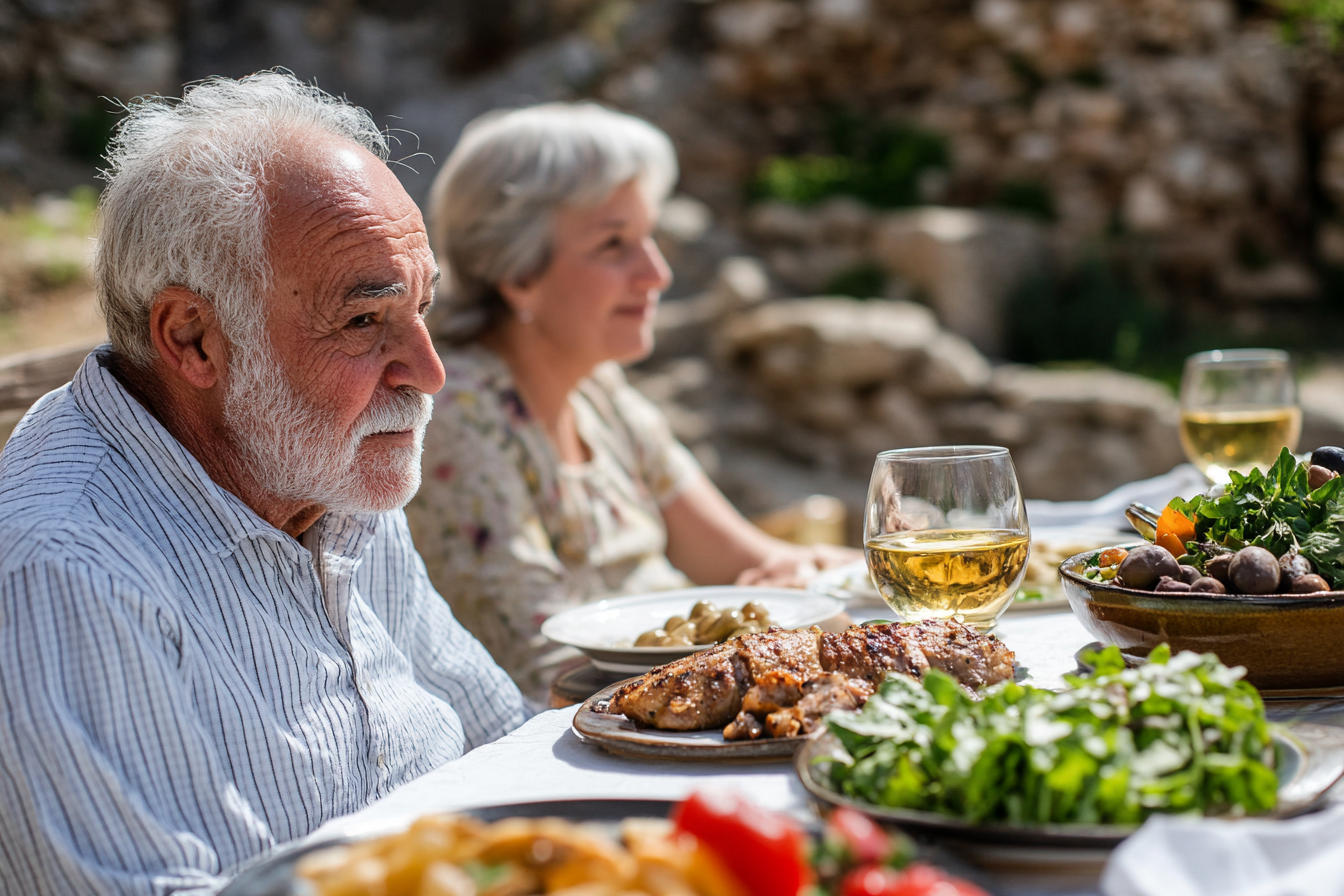
The brain may seem far removed from the dinner table, but what we eat profoundly affects our cognitive health. In Mediterranean regions, rates of dementia and Alzheimer’s disease are notably lower than in other parts of the world. And researchers believe the diet plays a key role in this protective effect.
At the heart of this connection is omega-3 fatty acids, abundant in fatty fish like salmon and sardines. These nutrients are essential for building and maintaining brain cells. Studies suggest that they reduce the buildup of beta-amyloid plaques, one of the heavily researched markers for Alzheimer’s disease.
Vegetables also pull their weight in building brain health. Dark leafy greens like spinach and kale are rich in folate and vitamin E, both linked to improved memory and slower cognitive decline. Add in polyphenols from olive oil and red wine—natural antioxidants that protect neurons from oxidative stress—and you have a recipe for a sharper, healthier brain.
There’s also something to be said for the Mediterranean way of eating, beyond the food itself. Meals are communal, often eaten with family or friends, and rarely rushed. Eating slowly, over a long period of time is healthier than fast food style eating where you wolf down food as quickly as possible. This combination of social connection and mindful eating can reduce cognitive stress—a major risk factor for cognitive decline. After all, the brain, like any other organ, thrives in a calm and nourishing environment.
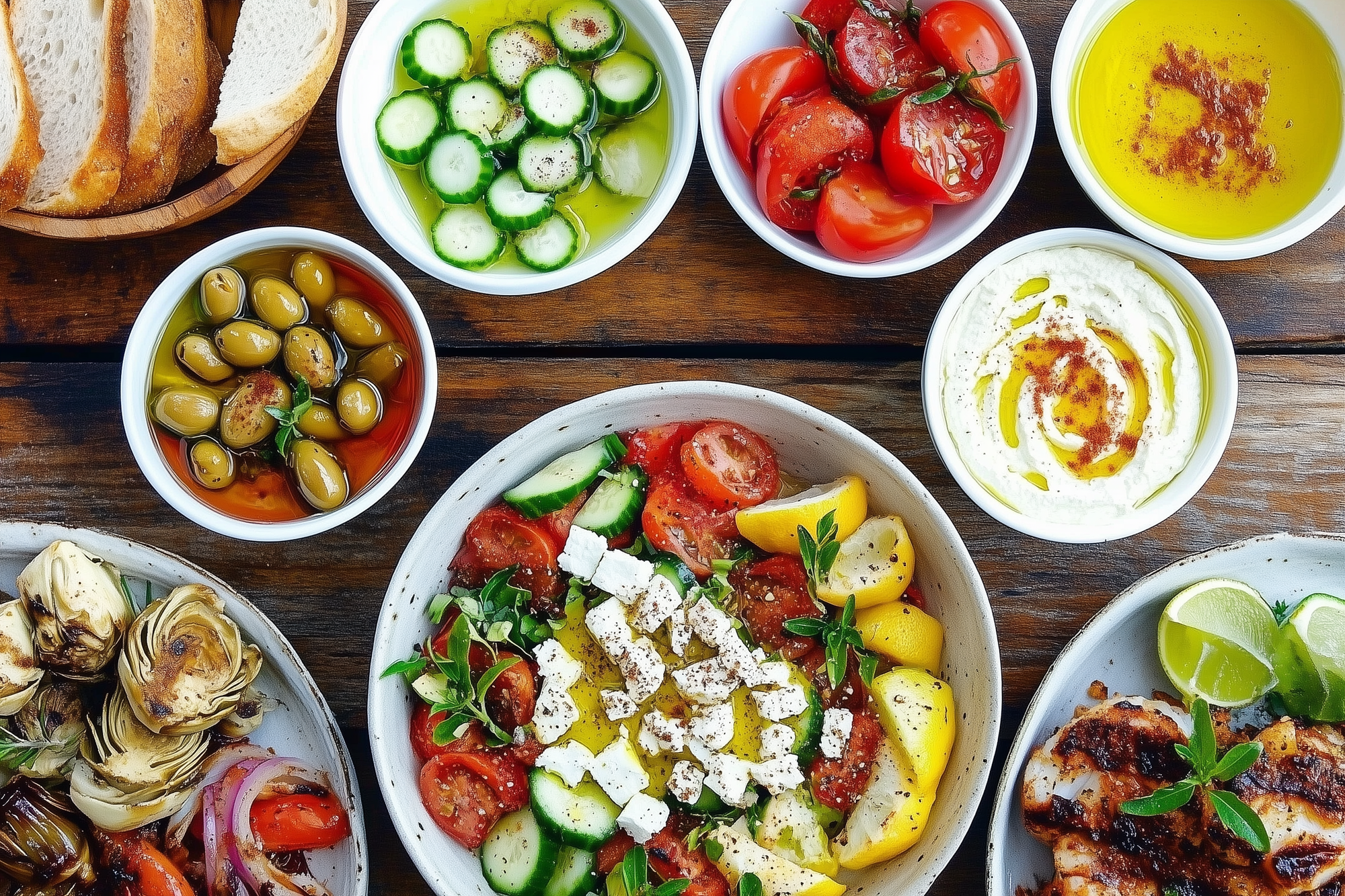
Every day, our cells wage an ongoing war against free radicals—unstable molecules that can damage DNA and accelerate aging. Left unchecked, this oxidative stress contributes to chronic diseases, from heart disease to cancer. The Mediterranean diet, rich in antioxidants, offers a powerful defense against free radicals and their impact on our longevity.
Take tomatoes, for instance. Whether stewed in a rustic sauce or sliced fresh for a salad, tomatoes are bursting with lycopene, a potent antioxidant. Studies suggest that lycopene not only protects cells but may also play a role in preventing prostate and breast cancer. Similarly, colorful fruits like berries and citrus are loaded with flavonoids and vitamin C, known to boost immune function and repair damaged cells.
Olive oil, the golden cornerstone of the Mediterranean diet, contains polyphenols that act as cellular bodyguards, neutralizing free radicals before they can wreak havoc. Even nuts, with their unassuming crunch, are rich in vitamin E, another powerful antioxidant that protects cell membranes from damage.
Interestingly, the Mediterranean diet doesn’t only prevent oxidative stress—it may also slow aging at the cellular level. Emerging research on telomeres, the protective caps at the ends of chromosomes, suggests that the Mediterranean diet can help preserve these structures. Longer telomeres are associated with longer lifespans, making the diet’s protective effects not just theoretical but measurable at the cellular level.
What’s remarkable is how seamlessly these foods are found everywhere in the daily lives of people in these regions. A handful of almonds with breakfast, a drizzle of olive oil over lunch, a plate of roasted vegetables at dinner—each small choice adds up to a diet that contributes to longevity at its most fundamental level.
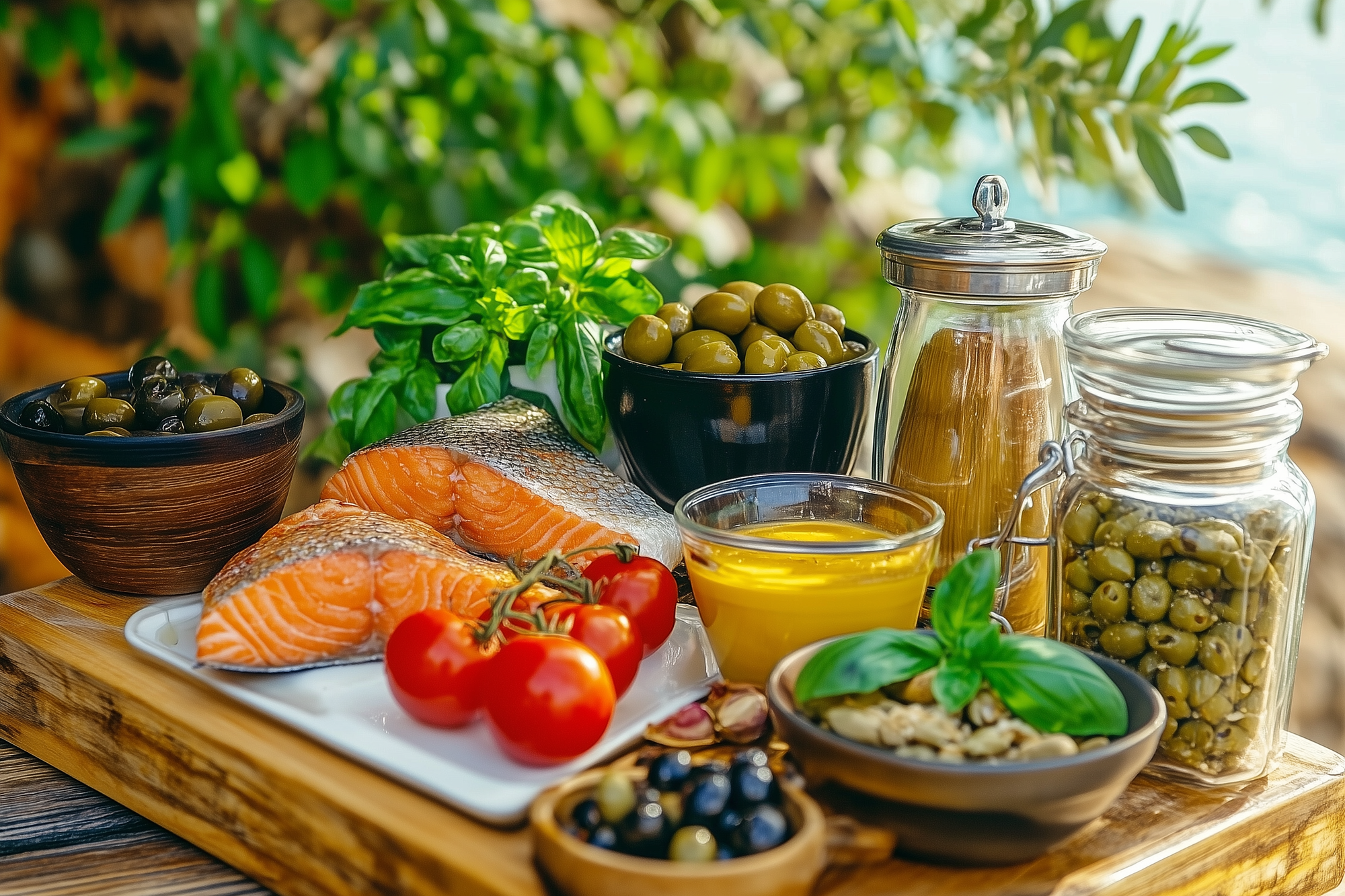
What separates the Mediterranean diet from a nutritional plan scribbled on a chart in a doctor’s office is its connection to life beyond the plate. In this part of the world, eating isn’t rushed or solitary—it’s a part daily living in a way that feeds your body and spirit alike.
First, there’s the pacing we mentioned earlier. Meals aren’t hurried affairs designed to "get the job done." Instead, they’re slow and deliberate, with plenty of time to savor each bite. This encourages a natural mindfulness that helps people recognize when they’re full, avoiding overeating without calorie counting or rigid restrictions. If you try to race through life, you may be disappointed to learn that it is over too quickly.
Then there’s the social element. Meals are often shared with family or friends, a practice that builds connection and reduces stress. The laughter and conversation that flow around the table aren’t just pleasant—they’re health-promoting. Chronic stress has been linked to a range of illnesses, from heart disease to cognitive decline. The Mediterranean approach to meals, rooted in community, serves as a natural antidote.
Physical activity fits naturally into Mediterranean life, not as a chore but as an intrinsic part of the day. Unlike regimented gym sessions or high-intensity workouts, movement here feels more natural. Walking to the market is an errand, yes, but it’s also a chance to greet neighbors and take in the sights and sounds of the town. Try to follow Kurt Vonnegut's advice on simple things like the act of mailing a letter. Gardening isn’t only about growing vegetables; it’s a meditative, hands-on practice that keeps the body engaged and connected to the earth. Even something as simple as taking the stairs—often multiple times a day in hilly villages—keeps muscles strong and hearts healthy.
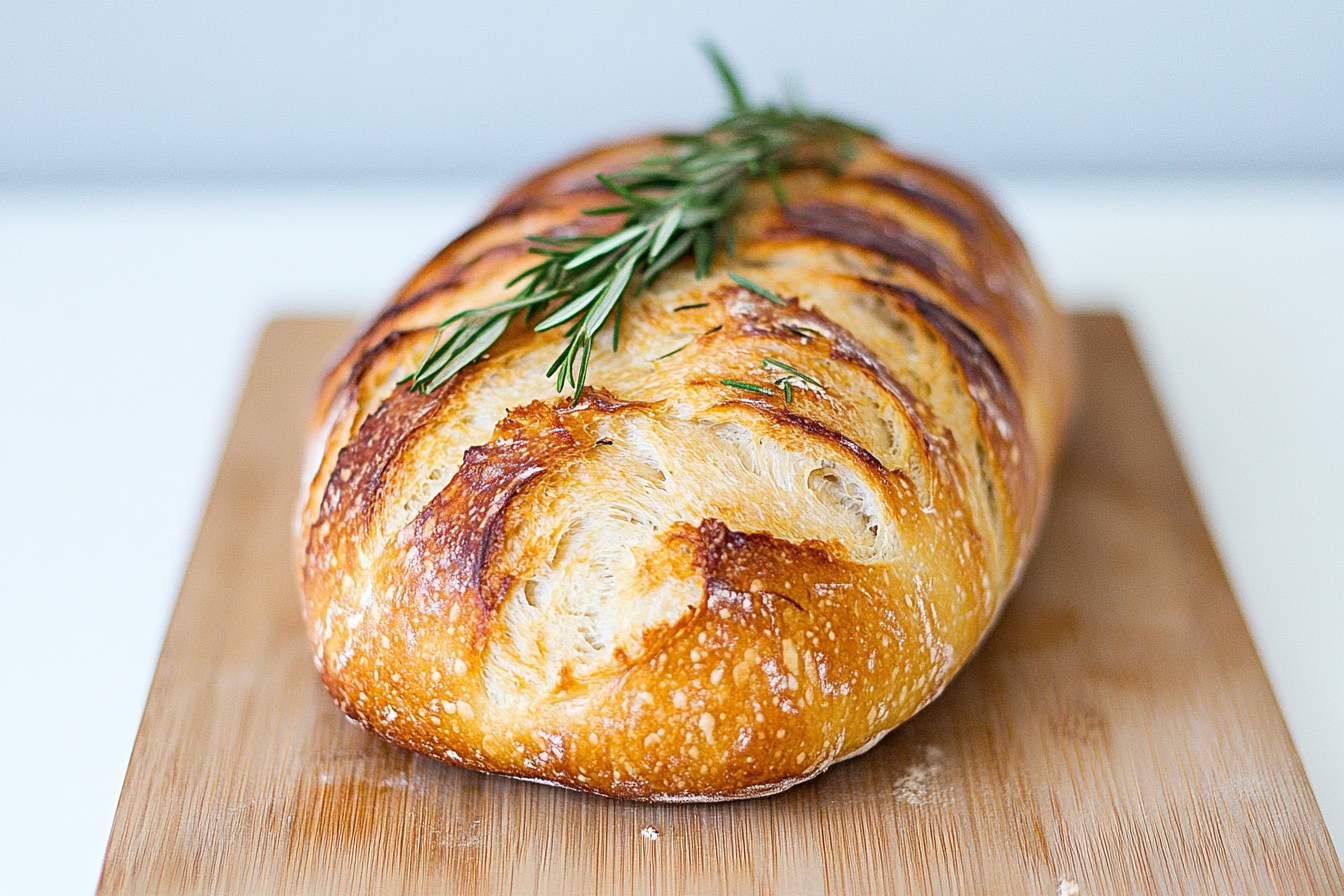
If the Mediterranean diet sounds too good to be true, consider the real-world evidence. Take Sardinia, an Italian island where shepherds sip local red wine and feast on fava beans and sourdough bread. Here, centenarians are not anomalies; they’re a celebrated part of the community. Researchers studying Sardinia’s longevity found that diet played a starring role, complemented by active lifestyles and strong social ties.
Or look to Ikaria, often called "the island where people forget to die." Inhabitants of this Greek isle eat a plant-heavy diet rich in olive oil and wild greens, drink herbal teas, and occasionally indulge in small amounts of meat or fish. Compared to the rest of the developed world, they have significantly lower rates of cancer, heart disease, and dementia.
The teas, often referred to as “mountain teas,” are made from native plants such as sage, oregano, rosemary, thyme, and wild mint. Another staple is sideritis, a flowering herb known locally as Greek mountain tea. These plants, many of which grow naturally in the rocky, sun-drenched terrain, are rich in antioxidants and anti-inflammatory compounds. They’re brewed simply—steeped in hot water, often with a squeeze of fresh lemon or a drizzle of local honey.
Hard data backs up these observations. The PREDIMED study, a large-scale clinical trial in Spain, demonstrated that a Mediterranean diet supplemented with extra virgin olive oil or nuts reduced the risk of major cardiovascular events by 30%. Another study found that adherence to the diet correlated with a lower risk of all-cause mortality, meaning people lived longer, healthier lives overall.
What’s particularly striking about these examples is how ordinary the diet is in its native context. There’s no special branding, no superfoods shipped across continents. Instead, it’s simply the way people have eaten for generations—proof that longevity doesn’t require gimmicks, just good food and good habits.
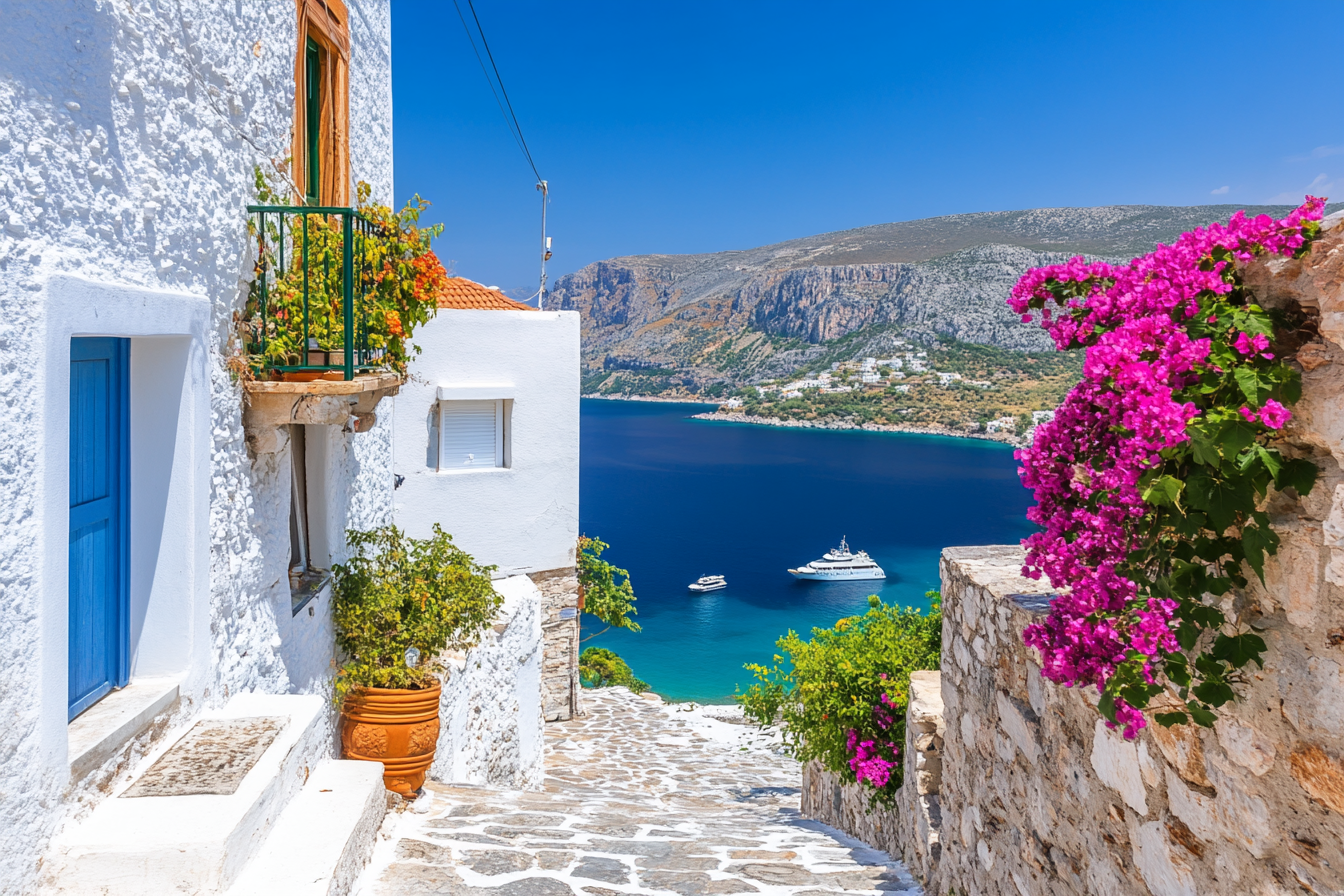
The Mediterranean diet might seem like a world away, but it’s surprisingly accessible, even if you’re far from the azure waters of the Aegean. The key is in its simplicity: focus on whole, minimally processed foods and balance, rather than perfection.
Small changes to the structure of meals can also bring your eating closer to the Mediterranean model. Sit down for meals whenever possible, avoid distractions like television, and take the time to enjoy what’s on your plate. These habits don’t just mimic the Mediterranean diet—they anchor it to your daily life in a way that feels sustainable, not forced.
What becomes clear is that the Mediterranean diet isn’t about deprivation or rigid rules. It’s about creating a sustainable relationship with food—one that celebrates flavor, prioritizes health, and supports a life that’s as full and vibrant as the meals themselves.
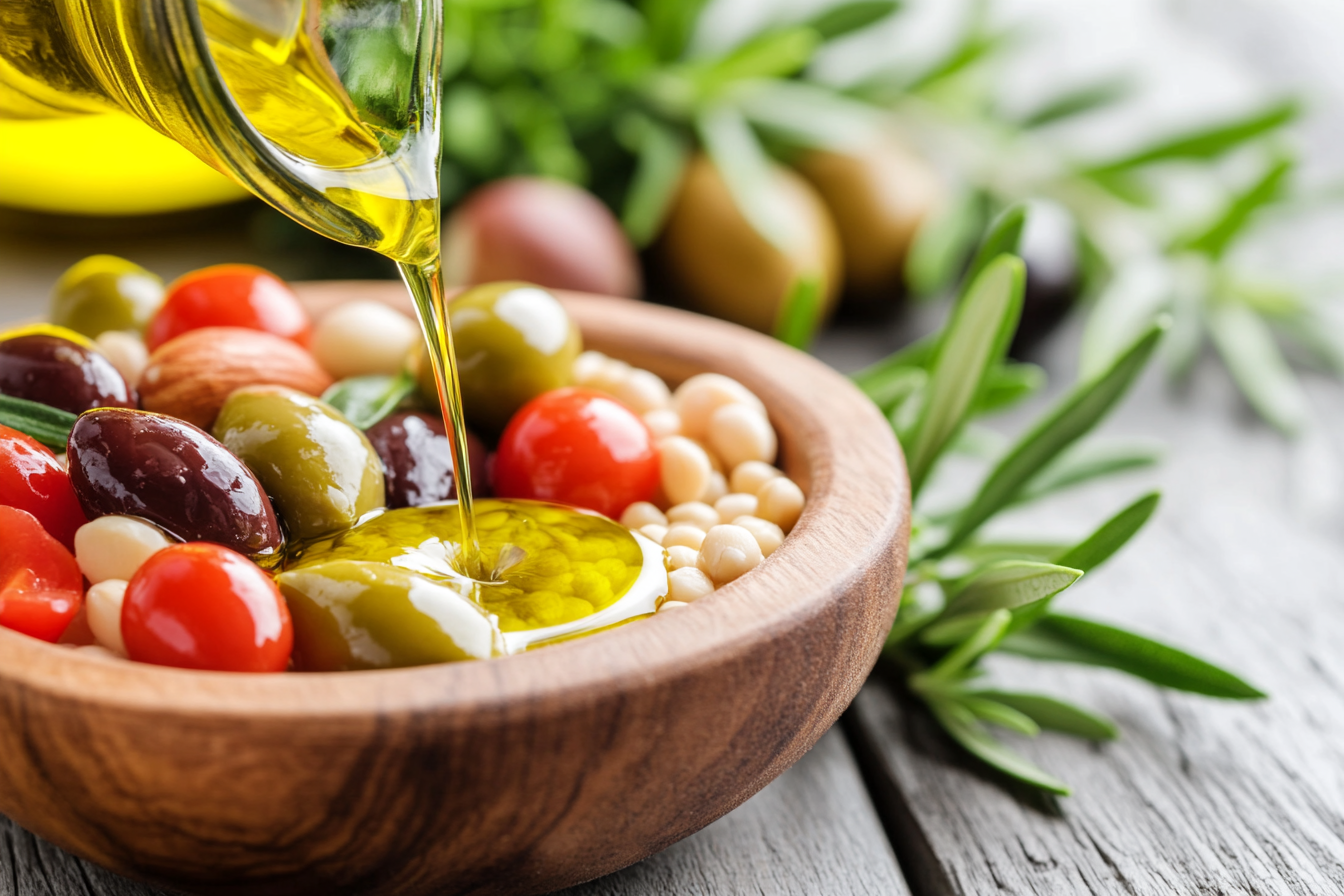
Bringing the Mediterranean diet into your life doesn’t mean overhauling your habits overnight or learning complicated recipes. It’s about building meals around fresh, wholesome ingredients and finding joy in cooking and eating. With a little prep and a few smart choices, you’ll quickly see how accessible—and delicious—this way of eating can be.
Think of your pantry as your toolkit. Stocking a few versatile ingredients ensures you’re always ready to put together a quick, Mediterranean-inspired meal. Start with these staples:
Once your pantry is stocked, cooking Mediterranean-style becomes effortless. The beauty is in the simplicity—most dishes use just a handful of these ingredients to create something satisfying and flavorful.
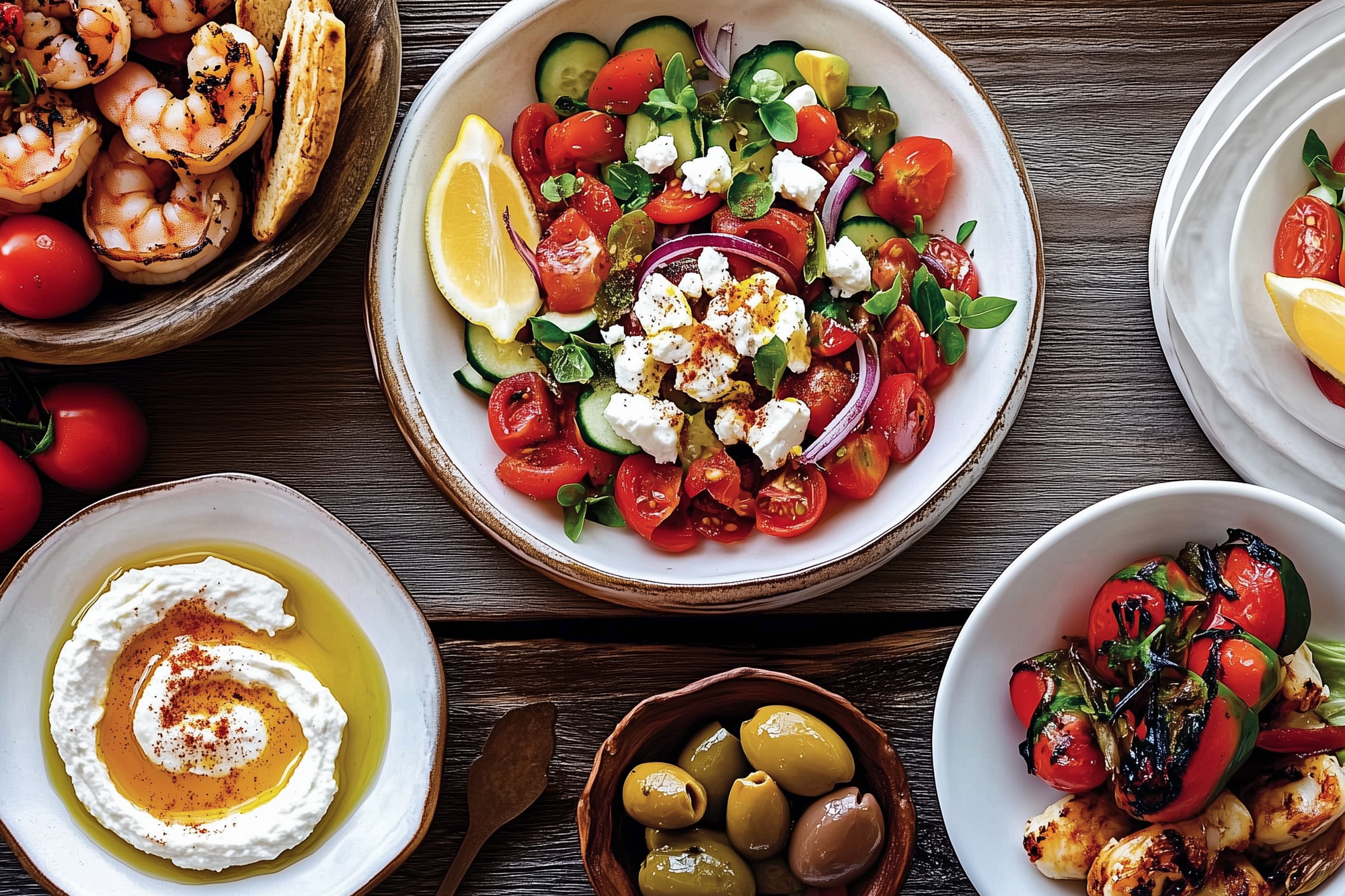
A good Mediterranean meal isn’t about strict rules. It’s about balance. Aim for a mix of vegetables, grains, and protein with a splash of olive oil to tie it all together.
Snacks are straightforward, too. Sliced veggies like cucumbers or peppers with hummus, or a small handful of nuts, keep you satisfied without weighing you down.
When dining out, the same principles apply: